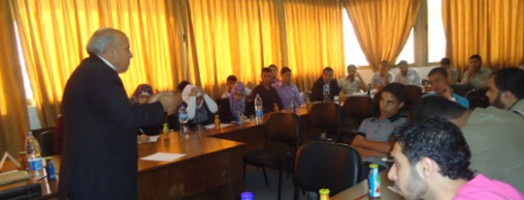The Right of Priority and Pre-emption under the Palestinian Law
With support from the Konrad Adenauer Stiftung, the Institute of Law (IoL) at Birzeit University held on 24 October 2011 a legal encounter on The Right of Priority and Pre-emption under the Palestinian Law. Professor Mousa Abu Mallouh, Lecturer at the Faculty of Law at Al -Azhar University, made the presentation.
In her opening remarks, Mrs. Lina Al- Tounisi, Coordinator of the IoL Gaza Office, welcomed the speaker and audience. Mrs. Al -Tounisi also highlighted the significance of mutual cooperation between the IoL and the Faculty of Law at Al- Azhar University, which has rendered this legal encounter successful. A total of 35 students of the Faculty of Law at Al- Azhar University attended the encounter.
In line with the Ottoman Mejelle, Professor Abu Mallouh identified pre-emption and explained that the concept first emerged in the Islamic thought during the Ottoman State period. Though it was not mentioned in the Noble Qur’an, the concept of pre-emption did appear in Prophet Mohammed’s Sunna and tradition. Pre-emption means to join something with something else.
Professor Abu Mallouh elaborated on the degrees of pre-emption, the person entitled to pre-emption, including a partner in the real property, joint owner and adjoining neighbour. He identified each category and provided examples on each type. Certain conditions should be in place to ensure that pre-emption is valid. Accordingly, pre-emption can only be established by a contract of sale and may not be bestowed by way of a gift. The property to which the right of pre-emption attaches must be real property held in absolute ownership (Mulk land). Several persons who enjoy a right of pre-emption will be dealt with according to their numbers. Furthermore, pre-emption does not devolve to heirs.
Procedures of pre-emption are strict and meticulous. In this context, three claims must be made in cases of pre-emption: a claim made immediately upon hearing of the sale; a claim made formally and in the presence of witnesses; and a claim that the person alleging the right of pre-emption is entitled to bring an action within 30 days and to be granted absolute ownership of the property. Professor Abu Mallouh explained each procedure separately.
Professor Abu Mallouh also addressed the right of Priority, making clear the difference between this right and the right of pre-emption. The right of Priority applies to state (Miri) land only and devolves to heirs. It is also applicable to a partner, joint owner, third party (e.g. owner of trees and buildings), or resident of the village. It does not belong to a neighbour who already has the right of pre-emption. Unlike pre-emption which is established by a contract of sale or a price, the right of Priority is established by a sale, gift or price.
During the legal encounter, students made significant interventions and raised questions that reflected their awareness and interest in the topic. These included inquires about methods to demonstrate the types of land, including Mulk and Miri land. In conclusion, Mrs. Lina Al-Tounisi extended thanks and gratitude of both IoL and Birzeit University to the speaker and audience for their effective participation and debate in the legal encounter.










